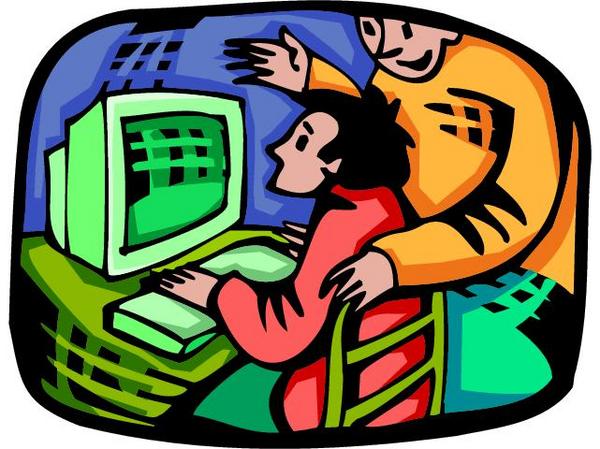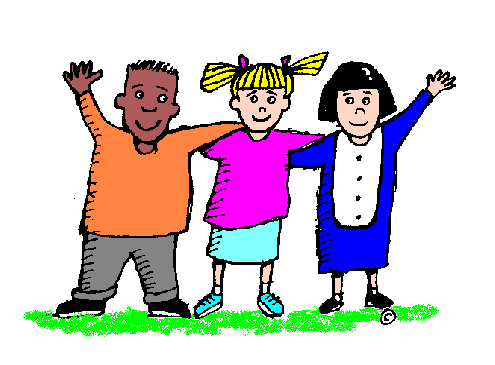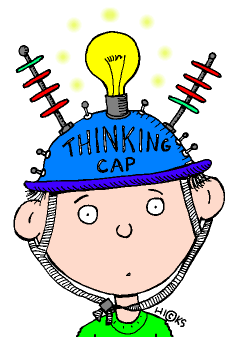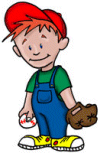Mrs. Hopper's Cheating Prevention Guide
What
is Cheating? * Examples of
Cheating * Paraphrasing * How can you avoid cheating? * Think for Yourself!
What is Cheating???

The Webster's Dictionary defines
"cheating" as:
Examples of Cheating...
 Susie is in
Mrs. Hopper's American History class. She has to write a one page paper
on the role of women in the Civil War.
Susie is in
Mrs. Hopper's American History class. She has to write a one page paper
on the role of women in the Civil War.
She reads the following sentence on the website:
Matt is in homeroom and realized that he forgot to do his Algebra homework. He asks Molly if he can see her homework
and quickly copies down the same answers.

Bobby, Jane, and Amy are working together on a group project. Bobby and Jane meet after class each day to finish their project, but Amy does not help the group at all. When the project is due, Amy puts her name on the project, even though she did not help her groupmates.
... This is cheating! Amy needs to come clean to her teacher. Maybe she has been really busy lately, maybe she didn't get along with her groupmates... no matter what the problem is, it is only fair to her groupmates and to herself to be honest with her teacher.
Some other examples of cheating include: copying off someone during a test, letting your mother write your paper, getting a paper on the web, using someone's opinion or argument without giving them credit...
How can you avoid cheating?
There are no excuses when it comes to cheating. Students who get caught cheating get an automatic zero on the assignment and a zero for participation in the class. That could be very damaging to your grade... so don't do it!
Mrs. Hopper has some suggestions to avoid cheating:
1) Trust your teacher
2) Trust yourself
Think
for Yourself!

Back
to Index
This activity was created to complete Plagiarism for SLM 521
- "to deprive of something valuable by the use of deceit or fraud",
OR
- "to practice fraud or trickery"
You can view these definitions at this
website: http://www.m-w.com/dictionary/cheating
Basically,
cheating is...
...trying to pass off someone
else's thoughts or works as your own!!!
 Susie is in
Mrs. Hopper's American History class. She has to write a one page paper
on the role of women in the Civil War.
Susie is in
Mrs. Hopper's American History class. She has to write a one page paper
on the role of women in the Civil War. She reads the following sentence on the website:
As
the war broke out she decided to use her acting abilities
and her southern birth to aide the Union case.
She writes the following sentence
in her paper:
After
the war began, Kate decided to use her southern heritage and acting
talents to help the Union army.
... This is cheating! All Susie
would need to do to avoid cheating is put the sentence in quotation
marks and cite the website at the end of her sentence.


Matt is in homeroom and realized that he forgot to do his Algebra homework. He asks Molly if he can see her homework
and quickly copies down the same answers.
...This
is cheating!!! Bobby should get
started on the homework in homeroom, and try to finish it before
Algebra. But, if he tells his Algebra teacher the situation, the
teacher might give him until the end of the day to do the work.

Bobby, Jane, and Amy are working together on a group project. Bobby and Jane meet after class each day to finish their project, but Amy does not help the group at all. When the project is due, Amy puts her name on the project, even though she did not help her groupmates.
... This is cheating! Amy needs to come clean to her teacher. Maybe she has been really busy lately, maybe she didn't get along with her groupmates... no matter what the problem is, it is only fair to her groupmates and to herself to be honest with her teacher.
Some other examples of cheating include: copying off someone during a test, letting your mother write your paper, getting a paper on the web, using someone's opinion or argument without giving them credit...
These aren't the only examples of
cheating. Cheating can happen in many situations and in many forms!
Paraphrasing
Paraphrasing is rewording a passage or sentence from a source. When you do research for your projects, you may find yourself paraphrasing text from books you read. Be careful: paraphrasing still needs to be properly quoted!
Incorrectly paraphrasing would give you this sentence:
Something that surprised archaeologists was the saber tooth tiger's strength (Pearce, 52).
Paraphrasing this would give you this sentence:
Paraphrasing is rewording a passage or sentence from a source. When you do research for your projects, you may find yourself paraphrasing text from books you read. Be careful: paraphrasing still needs to be properly quoted!
Let's paraphrase this
sentence together:
"The saber tooth tiger was
incredibly strong and fast; this is something that surprised
archaeologists." -Written by Sarah Pearce
Incorrectly paraphrasing would give you this sentence:
Something that surprised archaeologists was the saber tooth tiger's strength (Pearce, 52).
This is inappropriate
because the sentence was simply rearranged. It should be put in
quotation marks or properly paraphrased.
Paraphrasing this would give you this sentence:
According to Pearce, researchers
were surprised to learn that the saber tooth's greatest strength was
his speed (Pearce, 52).
This is appropriate
because we started the answer by citing the author, and then rephrased
the sentence completely, adding an opinionated
argument (the saber tooth's greatest strength...).
There are no excuses when it comes to cheating. Students who get caught cheating get an automatic zero on the assignment and a zero for participation in the class. That could be very damaging to your grade... so don't do it!
Mrs. Hopper has some suggestions to avoid cheating:
1) Trust your teacher
Your teachers are not here simply
to grade your work; they are here to help
you to learn. If you forgot an assignment, be honest with them.
Don't make up a story about your dog eating it... just tell them the
truth! It's very likely that your teacher will help you to find a way
to get the work done.
2) Trust yourself
Your teachers want to know what you know.
On tests, trust yourself and your own knowledge to get the answers
right. Don't look at your neighbor's paper. On papers, trust your
writing skills and your argument. Don't second guess yourself by using
others' opinions.
3)
Check and re-check your workIf, during any stage of your
research, you read someone else's opinion or work, you are at risk of
cheating. That is why you must always check and re-check your work. Ask
yourself: did I write this? Is every phrase in this argument mine
alone? Does this sound like something someone else said? When in doubt,
leave the phrase out of your paper or find the proper citation for the
information.
4)
Give credit where credit is dueIf you wrote a paper and one of
your classmates used the work, you would want to get credit for that
information, right? Right. The same goes with the people who write
stories you read, articles you use, or graphs you see. Anytime you
incorporate someone else's work in your
work, you need to give them credit. And then, when you're finished,
give yourself credit for doing such great work without cheating!

When you're taking a test and are
stuck, go with your gut answer... it's probably right and is a lot
better than cheating!
When you're writing, if you think
you might be plagiarizing, ask your teacher for their input!
When you're in a group and not
pulling your weight, catch up with the group and do the work!
You owe it to yourself to do all of your work yourself!
You owe it to yourself to do all of your work yourself!
This activity was created to complete Plagiarism for SLM 521